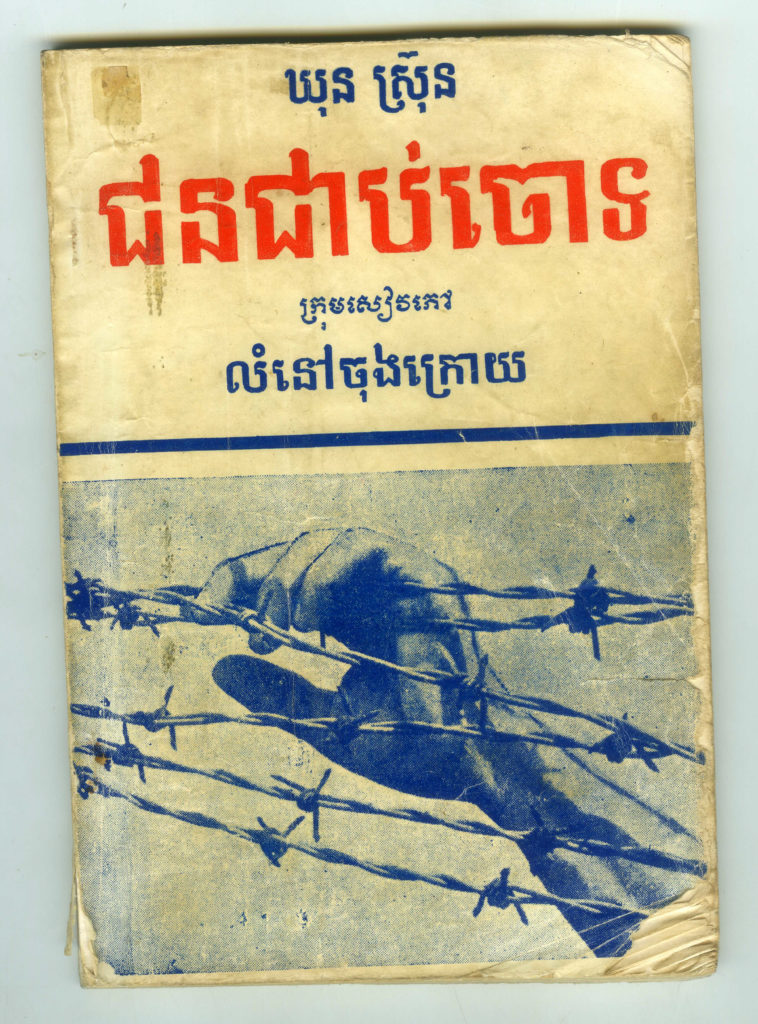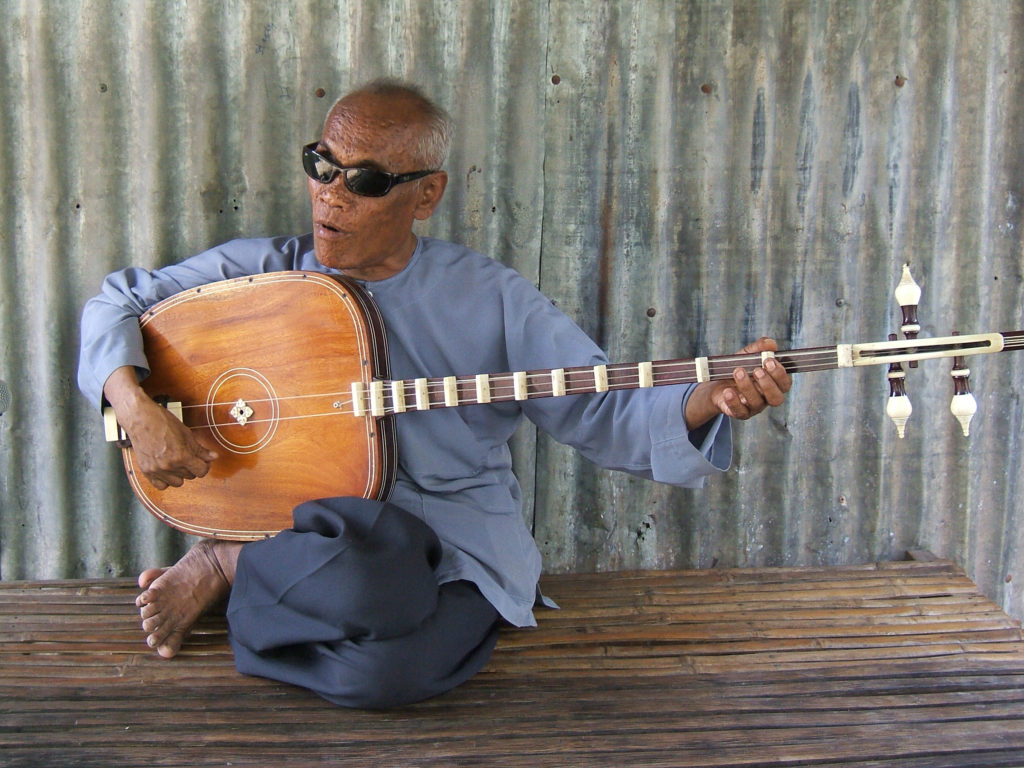Editors Sharon May and Trent Walker on Out of the Shadows of Angkor, the newest title from Mānoa journal, that publishes this month.
Out of the Shadows of Angkor, the newest title from MĀNOA, emerges from the thirty-year effort of a community seeking to bring together Khmer works of literature. In doing so, they not only translated rare works into English for the first time, but also helped to salvage, reconstruct, and resuscitate parts of books destroyed by the Cambodian Civil War. This issue represents a selection of what has been achieved.
Readers will find in this volume: a comprehensive range of Khmer works over 1400 years; translations of classical texts in ancient script; selections of modern Cambodian poetry, prose, and folk theater; and contemporary writings by Cambodian refugees and children of the diaspora living in countries from Australia to the U.S., Canada, and Europe. This is a companion volume to In the Shadow of Angkor (2004).
Below, guest editors Trent Walker and Sharon May tell us about how this book came together.
_________________________________________________________

University of Hawai‘i Press: What was the inspiration for this issue?
Trent Walker and Sharon May, Editors: Cambodian writers have been recording their literary gifts for over a millennium and a half. Yet very little Cambodian literature originally composed in Khmer, Sanskrit, or French is available in English. Our anthology seeks to change that by joining a plethora of original literary translations of Cambodian texts with works composed in English by members of the global Cambodian diaspora.
UHP: What is the book essentially about?
Editors: Out of the Shadows of Angkor unites the work of 33 different authors across fourteen centuries of Cambodian history. Their poems, short stories, novels, and essays are paired with a range of anonymous texts from the seventh century to the present, including inscriptions, oaths, chants, songs, epics, folk tales, and theater. Nineteen different translators make these works shine in English, offering accessible notes that frame these Cambodian compositions for a wide audience. A special emphasis on twentieth- and twenty-first-century writers, including those across four continents of the diaspora, showcases the present and emerging future of post-Khmer Rouge literature both inside and outside Cambodia.
UHP: Who was involved, and what was the process like of putting it together?
Editors: Sharon May, guest editor of In the Shadow of Angkor, a smaller but path-breaking 2004 anthology of contemporary Cambodian literature published by MĀNOA and University of Hawai‘i Press, brought together a team of four fellow guest editors over the course of over a decade. The guest editors—Phina So, Rinith Taing, Christophe Macquet, and Trent Walker, along with Sharon—have each long been leaders in advocating for Cambodian writers, literature, and publishing. We relied on each other’s strengths and on wide networks of literary friendships in Cambodia and beyond to bring the project to completion.
UHP: Tell us about the title. What’s the story of how you came to this title?
Editors: The title of the first volume, In the Shadows of Angkor, arose when Sharon was brainstorming with her friend Bhavia Wagner; Cambodian literature has long been in the shadows of the great temples and the tragedies of war, at least in the eyes of the West. As a considerably larger, non-overlapping companion volume to that 2004. MĀNOA anthology, Out of the Shadows of Angkor celebrates Cambodian poetry, prose, and performance emerging onto the world stage. Outside of the Khmer diaspora, Anglophone readers are still likely to only know Cambodia for the horrors of the Khmer Rouge or the splendors of Angkor Wat. Our book presents for the first time in English the vast spectrum of Cambodian writing through the ages—by turns joyous and tragic, pithy and elegant, tender and whip-smart.

UHP: What are some highlights of the issue? What should readers not miss?
Editors: The foreword by Vaddey Ratner and a special preface on Cambodian American writers by Sokunthary Svay set the tone for the book. Indradevi’s “In Praise of Sister Queens,” one of the oldest known works by a female author in Southeast Asia, and Brah Rajasambhar’s sixteenth-century poem, “My Soul of Gold,” long thought lost, anchor the classical section. Khun Srun’s “A Small Request” as well as excerpts from his novel The Accused cement his reputation as one of most insightful writers from the 1960s and ‘70s. Extracts from works by Nou Hach, Soth Polin, and Ty Chi Huot showcase the treasures of modern Khmer fiction. Poets ranging from Chey Chap and Pich Tum Kravel in Cambodia to Prince Amrindo Sisowath and Khau Ny Kim in France are also featured. Diasporic voices shine throughout: Maria Hach’s brilliant essay, “An Archive of Haunting,” especially in conversation with pieces by Boreth Ly and Elizabeth Chey, reveals powerful connections linking war, memory, and the arts. In the closing section on performance, the genius of Kong Nay, the country’s most famous living bard, comes to life through an extended interview as well as his bawdy lullaby, “An Elephant Rocks Its Trunk.” Throughout the issue, don’t miss the stunning paintings of Theanly Chov from his Surviving series, which capture the future-forward dreams of many Cambodians today.

UHP: Is there anything else that you’d like to share?
In addition to classical Cambodian literature that has never before been translated into English, this book presents writing that was nearly lost during Cambodia’s civil war, the Khmer Rouge regime, and its aftermath. When Sharon first began work on the previous volume, In the Shadow of Angkor, an American journalist told her, “Cambodians can’t write.” We hope that this new volume, Out of the Shadows of Angkor, shows that they most certainly can, and have done so for centuries with humor, wisdom, beauty, and depth.
_________________________________________________________
Trent Walker is a postdoctoral fellow of the Ho Center for Buddhist Studies at Stanford University and a specialist in the manuscripts and chanting practices of mainland Southeast Asia.
Sharon May worked for Columbia University’s Center for the Study of Human Rights—living and working in Cambodia while researching the Khmer Rouge regime—and was a Wallace Stegner Fellow in fiction at Stanford University.

Out of the Shadows of Angkor
Read free on Project MUSE:
by Sokunthary Svay
by Khun Srun, Christophe Macquet, Sharon May
Subscribe to MĀNOA
All MĀNOA subscribers will receive the issue, Out of the Shadows of Angkor, upon print publication in September 2022 and an additional volume on Burmese literature in Winter 2022. A one-year, individual subscription costs $35.
Order Out of the Shadows of Angkor
Order your copy on Amazon for $25. Shipping begins in September 2022.




